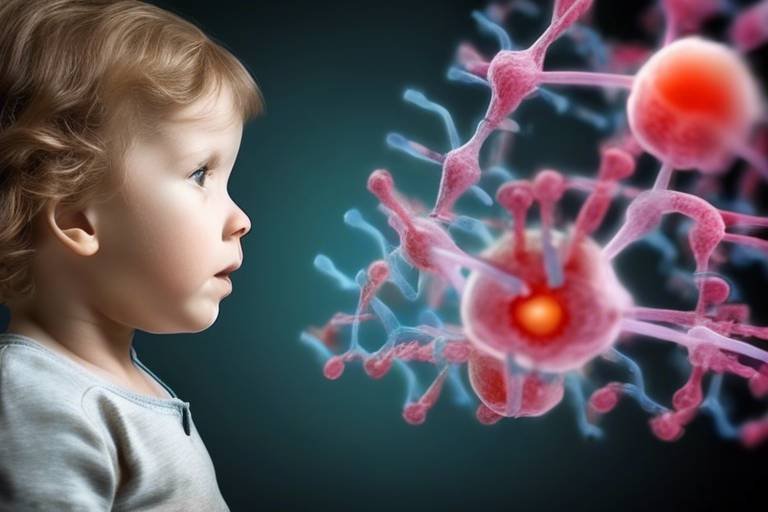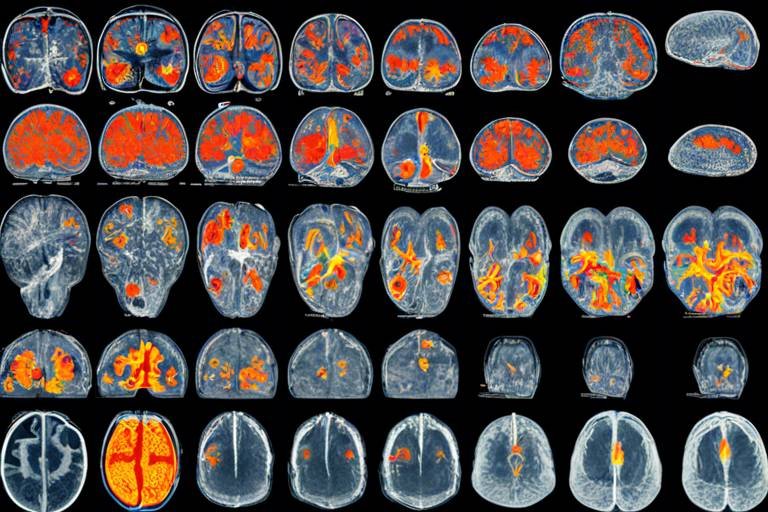Recent Discoveries in the Study of Epigenetics
Welcome to the fascinating world of epigenetics, where the age-old notion that our genes are our destiny is being turned on its head! Recent discoveries in this field have illuminated how our environment can significantly influence gene expression, leading to a cascade of effects on our health, susceptibility to diseases, and even the traits we pass on to future generations. Imagine your genes as a library, where epigenetic factors act as the librarians, deciding which books (or genes) get read and which gather dust. This dynamic interplay between our genetic code and environmental influences is a game-changer in understanding biology.
In recent years, scientists have made groundbreaking strides in uncovering the mechanisms behind epigenetic modifications. These alterations don't change the DNA sequence itself but rather modify how genes are expressed, akin to flipping a switch. This means that while you may inherit certain genes from your parents, the way those genes function can be dramatically altered by your lifestyle choices, stress levels, and even the foods you eat. The implications of these findings are profound, suggesting that we have more control over our genetic destiny than we previously thought.
Moreover, the implications of epigenetic research extend beyond individual health. They reach into the realms of public health and policy, suggesting that societal factors such as pollution and socioeconomic status can have lasting effects on genetic expression across generations. This adds a layer of complexity to our understanding of health disparities, indicating that some populations may be more vulnerable to certain diseases due to their unique environmental exposures. As we delve deeper into this exciting field, the potential for new therapeutic strategies and preventive measures based on epigenetic principles seems limitless.
As we explore the intricate dance between genes and the environment, we will uncover how these discoveries are reshaping our understanding of health and disease. From the role of diet and stress to the implications for chronic illnesses like cancer and neurodegenerative disorders, the study of epigenetics is opening doors to innovative approaches that could revolutionize medicine. Buckle up, because this journey into the world of epigenetics is just beginning!
- What is epigenetics? Epigenetics is the study of changes in gene expression that do not involve alterations to the underlying DNA sequence. It explains how environmental factors can influence how genes are turned on or off.
- How do environmental factors affect gene expression? Environmental factors such as diet, stress, and toxins can lead to epigenetic modifications, which can impact gene expression and potentially lead to health issues.
- Can epigenetic changes be inherited? Yes, some epigenetic changes can be passed down from one generation to another, affecting the health and traits of offspring.
- What role does diet play in epigenetics? Certain nutrients and compounds in food can induce epigenetic changes, influencing gene regulation and potentially impacting health outcomes.
- Is epigenetics relevant to cancer research? Absolutely! Understanding epigenetic alterations in tumors can provide insights into cancer progression and may lead to new treatment strategies.

The Basics of Epigenetics
Understanding the fundamental concepts of epigenetics is crucial for grasping its significance in biology. At its core, epigenetics refers to the study of changes in gene expression that do not involve alterations to the underlying DNA sequence. Imagine your DNA as a book, where the words are the genes. Epigenetics is like the annotations in the margins, highlighting certain passages while leaving others untouched. These annotations can be influenced by various factors, shaping how the genetic information is read and expressed.
To delve deeper, let's explore some key terms and mechanisms that define this fascinating field:
| Term | Description |
|---|---|
| DNA Methylation | A process where a methyl group is added to the DNA molecule, often leading to gene silencing. |
| Histone Modification | Chemical changes to the proteins around which DNA is wrapped, influencing gene accessibility. |
| Non-coding RNA | RNA molecules that do not code for proteins but play roles in regulating gene expression. |
These mechanisms work in concert to regulate gene expression, allowing cells to respond dynamically to their environment. For instance, when you experience stress, your body may activate certain genes that help you cope, while silencing others that are less critical at that moment. This flexibility is a testament to the power of epigenetics in shaping our health and behavior.
Moreover, epigenetic modifications can be inherited, meaning that the experiences and environments of one generation can influence the next. This concept raises intriguing questions about heredity and the potential for passing down not just genetic traits, but also the epigenetic marks that accompany them. Think of it as a family recipe that gets tweaked over generations—some ingredients remain the same, while others change based on what each cook has learned from their environment.
In summary, epigenetics bridges the gap between our genes and the environment, illustrating how our lifestyles and experiences can leave lasting marks on our genetic expression. This understanding is not just academic; it has profound implications for health, disease prevention, and even therapy. As we continue to uncover the layers of epigenetic regulation, the possibilities for improving human health seem boundless.
- What is epigenetics? Epigenetics is the study of changes in gene expression that do not involve changes to the underlying DNA sequence.
- How do environmental factors influence epigenetics? Environmental factors like diet, stress, and toxins can lead to epigenetic modifications, affecting how genes are expressed.
- Can epigenetic changes be inherited? Yes, epigenetic modifications can be passed down from one generation to the next, potentially influencing the health of future offspring.

Environmental Influences on Gene Expression
Have you ever thought about how your surroundings can shape who you are at a molecular level? It might sound like something out of a sci-fi movie, but the truth is, environmental factors play a significant role in influencing gene expression. This fascinating intersection of our environment and genetics is where epigenetics comes into play, revealing that our DNA is not the sole determinant of our biological fate. Instead, it’s like a complex symphony, where external elements act as conductors, guiding the performance of our genes.
Recent studies have shown that various factors such as diet, stress, and toxins can lead to significant epigenetic modifications. These changes can either enhance or suppress gene activity, ultimately affecting our health and susceptibility to diseases. For instance, imagine your genes as a light switch; while your DNA is the wiring, environmental influences can turn the switch on or off, altering the brightness of your health.
To illustrate this concept, let’s dive into a few key environmental influences:
- Diet: The food we consume is packed with nutrients and bioactive compounds that can trigger epigenetic changes. For example, certain vitamins and minerals can modify how genes express themselves, potentially leading to better health outcomes.
- Stress: Chronic stress can wreak havoc on our bodies, leading to long-lasting epigenetic changes that may predispose individuals to mental health issues. Think of stress as a constant storm cloud hovering over your genes, affecting their ability to function optimally.
- Toxins: Exposure to environmental toxins, such as heavy metals and pollutants, can also induce epigenetic modifications. These harmful substances can alter gene expression patterns, creating a ripple effect that can impact overall health.
As we continue to explore the depths of epigenetics, it becomes increasingly clear that our health is not solely determined by our genetic makeup. Instead, it is a dynamic interplay between our genes and the environment. This revelation opens up exciting possibilities for developing personalized medicine approaches that consider both genetic predispositions and environmental exposures.
In conclusion, understanding how environmental factors influence gene expression not only enriches our knowledge of biology but also empowers us to make informed lifestyle choices. By recognizing the power of our environment, we can actively participate in shaping our health and well-being.

Diet and Epigenetic Modifications
When it comes to our health, the adage "you are what you eat" takes on a whole new meaning in the context of epigenetics. Recent research has illuminated the intricate ways in which our diet can lead to epigenetic modifications, influencing gene expression in ways we never thought possible. Imagine your body as a complex orchestra, where your genes are the musicians playing their parts. Now, consider how the food you consume acts as the conductor, guiding these musicians to play in harmony or, at times, causing dissonance.
One of the most fascinating aspects of this relationship is how specific nutrients and bioactive compounds can trigger epigenetic changes. For instance, certain vitamins and minerals can modify the chemical tags that sit on our DNA, effectively turning genes on or off. A prime example of this is folate, a B vitamin that is crucial for DNA synthesis and repair. Folate is directly involved in the process of DNA methylation, which can lead to significant changes in gene expression patterns. When we consume adequate amounts of folate, we are not just nourishing our bodies; we are also ensuring that our genes can function optimally.
However, what happens when we fall short of this vital nutrient? A deficiency in folate can lead to a cascade of epigenetic alterations that may be linked to various diseases, such as cardiovascular issues and certain cancers. This underscores the importance of a balanced diet rich in essential nutrients. Foods high in folate include leafy greens, legumes, and fortified cereals, making it relatively easy to incorporate into our daily meals.
But folate is just the tip of the iceberg. Another group of compounds that has garnered attention in the realm of epigenetics is polyphenols. Found abundantly in fruits, vegetables, tea, and red wine, polyphenols have been shown to exert protective effects against various diseases, including cancer. These compounds work by modulating gene expression through epigenetic mechanisms, such as histone modification and DNA methylation. For example, the polyphenol resveratrol, found in grapes, has been linked to the activation of genes that promote longevity and cellular repair.
In summary, the connection between diet and epigenetic modifications is not just a fascinating area of study; it has real-world implications for our health. By understanding how the foods we eat can influence our genetic expression, we can make informed dietary choices that support our well-being. As we continue to unravel the complexities of epigenetics, it becomes increasingly clear that our plates play a pivotal role in shaping our genetic destiny.
- What are epigenetic modifications?
Epigenetic modifications are changes to gene expression that do not involve alterations to the underlying DNA sequence. These modifications can be influenced by environmental factors, including diet. - How does diet affect gene expression?
Certain nutrients can induce epigenetic changes by modifying the chemical tags on DNA, leading to the activation or silencing of specific genes. - What role does folate play in epigenetics?
Folate is crucial for DNA methylation, a key epigenetic process. Adequate folate intake can help maintain healthy gene expression, while deficiency may lead to harmful epigenetic changes. - Are polyphenols beneficial for health?
Yes, polyphenols found in various foods have been shown to positively influence gene expression and may play a role in preventing diseases like cancer.

Folate and DNA Methylation
Folate, a vital B-vitamin, plays a crucial role in various biological processes, particularly in the realm of DNA methylation. This process is a key epigenetic mechanism that involves the addition of a methyl group to the DNA molecule, which can significantly influence gene expression without altering the underlying DNA sequence. Imagine DNA as a book of recipes; methylation acts as a bookmark, determining which recipes are accessible and which are tucked away, hidden from view. When we think about the implications of folate deficiency, it becomes evident that the stakes are high. A lack of this essential nutrient can lead to a cascade of epigenetic changes that may predispose individuals to various health issues, including some forms of cancer and neurological disorders.
Research has shown that adequate levels of folate are necessary for the proper functioning of enzymes involved in the methylation process. These enzymes, known as methyltransferases, rely on folate to facilitate the transfer of methyl groups to DNA. Without sufficient folate, the balance of methylation can be disrupted, leading to hypomethylation or hypermethylation of critical genes. This imbalance can result in the activation of oncogenes or the silencing of tumor suppressor genes, both of which are pivotal in the development of cancer. To put it simply, folate acts as a guardian of our genetic integrity, helping to ensure that our genes are expressed appropriately.
Furthermore, the relationship between folate and DNA methylation is not just a matter of individual health but also has implications for future generations. Maternal folate levels during pregnancy are particularly important, as they can influence the epigenetic programming of the fetus. Studies have indicated that low folate intake during pregnancy can lead to increased risks of neural tube defects and other developmental disorders in children. This highlights the importance of ensuring adequate folate consumption, not only for personal health but also for the health of future generations.
In summary, folate is more than just a nutrient; it is a critical player in the complex dance of epigenetics. Its role in DNA methylation underscores the importance of nutrition in maintaining our genetic health. As we continue to uncover the intricate connections between our diet and our genes, it becomes increasingly clear that what we eat can shape not just our health, but also the health of generations to come.
- What is folate? Folate is a B-vitamin that is essential for DNA synthesis and repair, as well as for proper cell division.
- How does folate influence DNA methylation? Folate provides the necessary components for the methylation process, which can regulate gene expression.
- What are the consequences of folate deficiency? Deficiency in folate can lead to improper DNA methylation, increasing the risk of diseases such as cancer and developmental disorders.
- How can I ensure I get enough folate? Including foods rich in folate, such as leafy greens, legumes, and fortified cereals in your diet can help maintain adequate levels.

Polyphenols and Gene Expression
When we think about the foods we consume, we often focus on calories, vitamins, and minerals, but what if I told you that certain compounds in our food could actually change the way our genes express themselves? Enter polyphenols, a group of naturally occurring compounds found predominantly in fruits, vegetables, tea, and red wine. These tiny warriors of nutrition are not just antioxidants; they have the potential to influence gene expression through various epigenetic mechanisms.
Recent research has illuminated the fascinating role of polyphenols in gene regulation. For instance, studies have shown that polyphenols can modify DNA methylation patterns and histone modifications, which are critical processes in the way our genes are turned on or off. This means that what we eat could have a direct impact on how our genetic information is utilized. Imagine your genes as a book; polyphenols can act like a skilled editor, deciding which chapters to highlight and which ones to put on the back burner.
One of the most exciting aspects of polyphenols is their potential role in cancer prevention. Research indicates that certain polyphenols can inhibit the expression of genes associated with tumor growth while promoting the expression of genes involved in cell repair and apoptosis (programmed cell death). This dual action could help in preventing the onset of cancer. For example, compounds like resveratrol, found in red wine, and curcumin, present in turmeric, have been studied for their ability to modulate gene expression in ways that could thwart cancer progression.
To give you a clearer picture, let’s look at some common polyphenols and their associated effects on gene expression:
| Polyphenol | Source | Potential Effects on Gene Expression |
|---|---|---|
| Resveratrol | Red wine, grapes | Inhibits cancer cell proliferation; promotes apoptosis |
| Curcumin | Turmeric | Modulates inflammatory gene expression; promotes DNA repair |
| Quercetin | Onions, apples | Reduces oxidative stress; influences cell signaling pathways |
| Epigallocatechin gallate (EGCG) | Green tea | Inhibits tumor growth; enhances detoxification genes |
As you can see, the relationship between polyphenols and gene expression is complex but incredibly promising. By incorporating a variety of polyphenol-rich foods into your diet, you may not only enjoy delicious meals but also harness the power of these compounds to support your health at a molecular level. It's like planting a garden: the more diverse your plants (or foods), the more robust your ecosystem (or health) will be.
In conclusion, polyphenols offer a remarkable glimpse into the world of epigenetics, showing us that our dietary choices can have profound effects on our genetic expression. So next time you reach for that piece of fruit or pour a cup of green tea, remember that you might just be doing more than nourishing your body—you could be positively influencing your genes!
- What are polyphenols? Polyphenols are natural compounds found in plant foods that have antioxidant properties and can influence gene expression.
- How do polyphenols affect gene expression? They can modify DNA methylation and histone modifications, which regulate how genes are expressed.
- Can polyphenols help prevent cancer? Yes, some studies suggest that polyphenols can inhibit tumor growth and promote the expression of cancer-fighting genes.
- What are some foods high in polyphenols? Foods like berries, dark chocolate, red wine, and green tea are rich in polyphenols.

Stress and Epigenetic Changes
Stress is an inevitable part of life. Whether it's a looming deadline at work, personal relationships, or financial worries, we all face stressors that can feel overwhelming. But did you know that this stress doesn't just affect your mood or mental state? It can actually lead to epigenetic changes that may have lasting effects on your health. Think of your genes as a library filled with books. Stress can be likened to a librarian who decides to rearrange those books, making it harder for you to find the information you need when you need it.
Recent studies have shown that chronic stress can lead to significant modifications in our genetic expression. This is primarily due to changes in the way our genes are regulated. For instance, stress can trigger the release of hormones like cortisol, which can alter the methylation patterns of DNA. Methylation is a process that can turn genes on or off, and when stress interferes with this process, it can lead to a variety of health issues, including anxiety, depression, and even chronic diseases.
One of the most fascinating aspects of this research is the idea that these epigenetic changes can be passed down through generations. Imagine a scenario where a parent experiences high levels of stress during pregnancy. The epigenetic modifications that occur in response to that stress could potentially affect not only the individual but also their children. This phenomenon raises questions about how much of our genetic predisposition to certain diseases might actually stem from the experiences of our ancestors.
To illustrate how stress impacts epigenetics, consider the following table that summarizes some key findings:
| Type of Stress | Epigenetic Change | Potential Health Implications |
|---|---|---|
| Chronic Psychological Stress | Increased DNA Methylation | Anxiety, Depression |
| Physical Stress (e.g., Injury) | Altered Histone Modifications | Inflammation, Autoimmune Disorders |
| Environmental Stressors (e.g., Pollution) | Changes in Non-Coding RNA Expression | Respiratory Diseases, Cancer |
Understanding the link between stress and epigenetic changes opens up new avenues for treatment and prevention. By managing stress through mindfulness practices, exercise, and healthy lifestyle choices, we may be able to mitigate some of these adverse effects. It's like tuning a musical instrument; with the right adjustments, you can create a harmonious outcome rather than a cacophony of discord.
In conclusion, stress is more than just a mental burden; it's a biological catalyst that can reshape our genetic landscape. As we continue to unravel the complexities of epigenetics, it's crucial to recognize the power we have over our health through stress management. This knowledge empowers us to make informed choices that not only benefit us but may also positively impact future generations.
- What are epigenetic changes? Epigenetic changes refer to modifications that affect gene expression without altering the underlying DNA sequence. These changes can be influenced by environmental factors, including stress.
- How does stress affect gene expression? Stress can lead to hormonal changes that modify the way genes are regulated, potentially turning them on or off, which can have significant health implications.
- Can epigenetic changes be reversed? Some epigenetic changes can be reversed through lifestyle changes, such as improved diet, exercise, and stress management techniques.
- Are epigenetic changes hereditary? Yes, some epigenetic modifications can be passed down to future generations, affecting their health and susceptibility to diseases.

Epigenetics and Disease
The relationship between epigenetics and various diseases is a fascinating and rapidly evolving area of research. As scientists delve deeper into the mechanisms of gene expression, they uncover how epigenetic modifications can influence the onset and progression of diseases like cancer and neurodegenerative disorders. Unlike genetic mutations, which are permanent changes to the DNA sequence, epigenetic changes can be reversible and are often influenced by environmental factors, lifestyle choices, and even our diet. This opens up a world of possibilities for developing new treatment strategies that target these modifications rather than the genes themselves.
Recent studies have highlighted several key findings that connect epigenetic changes to disease development. For instance, in cancer research, it has been shown that tumors often exhibit specific epigenetic alterations that contribute to their malignancy. These alterations can silence tumor suppressor genes or activate oncogenes, leading to uncontrolled cell growth. Understanding the epigenetic landscape of tumors not only aids in identifying potential biomarkers for early detection but also paves the way for innovative therapeutic approaches that could reverse these changes.
Additionally, neurodegenerative disorders such as Alzheimer's and Parkinson's disease have also been linked to epigenetic modifications. Research suggests that factors such as aging, inflammation, and environmental toxins can lead to lasting changes in gene expression that may contribute to the development of these debilitating conditions. For example, certain epigenetic marks may alter the expression of genes involved in neuronal health and function, potentially accelerating neurodegeneration. This relationship underscores the importance of understanding how lifestyle factors, such as diet and stress, can affect our epigenetic profile and, consequently, our risk for such diseases.
To illustrate the connection between epigenetics and disease, consider the following table that summarizes some of the key diseases associated with epigenetic alterations:
| Disease | Epigenetic Changes | Potential Implications |
|---|---|---|
| Cancer | DNA methylation, histone modification | Gene silencing of tumor suppressor genes, activation of oncogenes |
| Alzheimer's Disease | Histone acetylation, DNA methylation | Altered expression of genes involved in neuronal health |
| Parkinson's Disease | Non-coding RNA regulation | Impact on neuronal survival and function |
In summary, the study of epigenetics offers a promising avenue for understanding the complex interplay between our genes and the environment in the context of disease. By unraveling these connections, researchers are not only gaining insights into the mechanisms of disease but also identifying potential targets for therapeutic intervention. This could lead to more personalized and effective treatment strategies that take into account an individual's unique epigenetic profile, ultimately enhancing patient outcomes and paving the way for a healthier future.
- What is epigenetics? - Epigenetics is the study of changes in gene expression that do not involve alterations to the underlying DNA sequence.
- How do environmental factors affect epigenetics? - Factors such as diet, stress, and exposure to toxins can lead to epigenetic modifications that influence gene expression.
- Can epigenetic changes be reversed? - Yes, many epigenetic modifications are reversible, which presents opportunities for therapeutic interventions.
- What role does epigenetics play in cancer? - Epigenetic changes can lead to the silencing of tumor suppressor genes and activation of oncogenes, contributing to cancer progression.
- Are epigenetic changes hereditary? - Some epigenetic changes can be passed down through generations, potentially influencing the health of offspring.

Epigenetics in Cancer Research
Understanding the intricate relationship between epigenetics and cancer has become a focal point in modern medical research. As we delve deeper into the mechanisms that govern gene expression, it becomes increasingly clear that epigenetic alterations can significantly influence the development and progression of various cancers. Unlike genetic mutations, which are permanent changes in the DNA sequence, epigenetic modifications can be reversible and are often triggered by external factors such as lifestyle, diet, and environmental toxins.
Recent studies have shown that epigenetic changes, such as DNA methylation and histone modification, play a crucial role in tumorigenesis. For instance, the silencing of tumor suppressor genes through hypermethylation can lead to uncontrolled cell growth, a hallmark of cancer. Conversely, the activation of oncogenes—genes that have the potential to cause cancer—can also be facilitated by epigenetic mechanisms. This duality highlights the complexity of cancer biology and the potential for therapeutic interventions.
One of the most exciting areas of research is the investigation of epigenetic biomarkers for cancer diagnosis and prognosis. By identifying specific epigenetic changes associated with different cancer types, researchers aim to develop non-invasive tests that can detect cancer at an early stage. For example, certain patterns of DNA methylation have been linked to breast and colon cancers, paving the way for potential screening tools that could save lives.
Moreover, the field of epigenetic therapy is rapidly evolving. Drugs that target epigenetic modifications, such as DNA methyltransferase inhibitors and histone deacetylase inhibitors, are being explored in clinical trials. These therapies aim to reverse abnormal epigenetic changes in cancer cells, restoring normal gene function and halting tumor growth. The potential for personalized medicine is enormous, as these treatments could be tailored based on an individual's unique epigenetic profile.
However, while the promise of epigenetic research in cancer is vast, it is not without challenges. The complexity of epigenetic regulation means that researchers must navigate a labyrinth of interactions that can vary significantly between individuals and cancer types. Additionally, understanding the long-term effects of epigenetic therapies remains a critical area of investigation, as unintended consequences could arise from altering the epigenome.
In summary, the exploration of epigenetics in cancer research is a rapidly advancing field that holds the potential to revolutionize our understanding of cancer biology. By unraveling the epigenetic underpinnings of tumorigenesis, we are not only gaining insights into how cancers develop but also paving the way for innovative therapeutic strategies that could transform patient care.
- What is epigenetics? Epigenetics is the study of changes in gene expression that do not involve alterations to the underlying DNA sequence. These changes can be influenced by various environmental factors.
- How does epigenetics affect cancer? Epigenetic modifications can lead to the silencing of tumor suppressor genes and the activation of oncogenes, contributing to cancer development.
- Can epigenetic changes be reversed? Yes, many epigenetic changes are reversible, which is why epigenetic therapies are being explored as potential cancer treatments.
- What are some examples of epigenetic therapies? Examples include DNA methyltransferase inhibitors and histone deacetylase inhibitors, which aim to restore normal gene function in cancer cells.

Neurodegenerative Disorders and Epigenetics
Neurodegenerative disorders, such as Alzheimer's disease and Parkinson's disease, are complex conditions that have puzzled researchers for decades. What if I told you that our genes aren't the only players in this game? That's right! Epigenetics—the study of how environmental factors can influence gene expression without altering the underlying DNA sequence—has emerged as a fascinating field that sheds light on these debilitating diseases. Recent studies suggest that epigenetic modifications may play a crucial role in the onset and progression of neurodegenerative disorders.
One of the most intriguing aspects of epigenetics is its ability to provide a bridge between our environment and our genetic makeup. For instance, factors such as diet, stress, and exposure to toxins can lead to changes in gene expression that may contribute to neurodegenerative diseases. Imagine your genes as a book, where the epigenetic modifications act like bookmarks that can highlight or obscure certain passages. This means that even if you have a genetic predisposition to a particular disorder, the way your environment interacts with your epigenome can determine whether or not that predisposition manifests as an actual disease.
Research has shown that specific epigenetic changes, such as DNA methylation and histone modification, can influence neuronal health and functionality. For example, in Alzheimer's disease, abnormal methylation patterns have been observed in genes related to inflammation and neuronal survival. This suggests that the epigenetic landscape of individuals with Alzheimer's may be altered in ways that promote disease progression. Similarly, in Parkinson's disease, studies have indicated that certain genes involved in dopamine production may be epigenetically modified, leading to the characteristic motor symptoms of the disorder.
But how do these epigenetic changes occur? Well, they can be triggered by a variety of environmental factors. Here are a few key influencers:
- Diet: Certain nutrients, like omega-3 fatty acids and antioxidants, have been shown to support healthy epigenetic regulation, while a diet high in processed foods may lead to detrimental changes.
- Stress: Chronic stress can lead to the release of hormones that influence epigenetic modifications, potentially increasing the risk of neurodegenerative diseases.
- Toxins: Exposure to environmental toxins, such as heavy metals or pesticides, can result in epigenetic changes that affect neuronal health.
As we delve deeper into the world of epigenetics, it becomes increasingly clear that understanding these modifications could open new avenues for treatment and prevention of neurodegenerative disorders. For instance, researchers are exploring the potential of epigenetic therapies that could reverse harmful modifications or enhance protective ones. Imagine a future where we can not only identify individuals at risk for these diseases but also intervene at the epigenetic level to prevent their onset!
In conclusion, the relationship between epigenetics and neurodegenerative disorders is a rapidly evolving area of research that holds great promise. By unraveling the complex interplay between our genes and the environment, we may be able to develop innovative strategies to combat these debilitating conditions and improve the quality of life for millions of individuals worldwide.
- What is epigenetics? Epigenetics is the study of changes in gene expression that do not involve alterations to the underlying DNA sequence. It focuses on how environmental factors can influence these changes.
- How does epigenetics relate to neurodegenerative disorders? Epigenetic modifications can affect the expression of genes involved in neuronal health, potentially contributing to the onset and progression of disorders like Alzheimer's and Parkinson's.
- Can lifestyle changes impact epigenetic modifications? Yes! Factors such as diet, exercise, and stress management can influence epigenetic changes, which may, in turn, affect health outcomes.
Frequently Asked Questions
- What is epigenetics?
Epigenetics is the study of changes in gene expression that do not involve alterations to the underlying DNA sequence. It's like a dimmer switch on a light; instead of changing the bulb itself, you're adjusting how much light it emits. This field explores how environmental factors, such as diet and stress, can influence these changes, ultimately affecting our health and behavior.
- How do environmental factors influence gene expression?
Environmental factors like diet, stress, and toxins can trigger epigenetic modifications, which in turn can turn genes on or off. Imagine your genes as a library; environmental influences can determine which books are checked out and read, impacting how your body functions. Recent studies have shown that even small changes in our environment can lead to significant shifts in gene activity.
- What role does diet play in epigenetics?
Certain dietary components can induce epigenetic changes that affect gene regulation. For example, nutrients such as folate and polyphenols found in fruits and vegetables can modify how genes express themselves. Think of it as feeding your genes the right ingredients to ensure they perform optimally, much like a chef selecting quality ingredients for a delicious dish.
- Can stress affect our genes?
Absolutely! Chronic stress can lead to lasting epigenetic changes that may influence mental health and overall well-being. It's akin to the way a storm can leave its mark on a landscape; prolonged stress can reshape how our genes function, affecting everything from mood to physical health.
- How is epigenetics related to diseases like cancer?
Epigenetic changes are increasingly recognized as key players in the development of various diseases, including cancer. These modifications can drive tumor progression and even contribute to treatment resistance, making them a focal point for researchers looking to develop new therapies. It’s like discovering hidden pathways in a maze that could lead to effective solutions.
- Are there any connections between epigenetics and neurodegenerative disorders?
Yes, emerging research suggests that epigenetic factors may play a significant role in neurodegenerative diseases such as Alzheimer's and Parkinson's. These modifications can influence the progression of these conditions, highlighting the importance of understanding epigenetics in developing potential interventions. Think of it as unlocking a door to new possibilities in treatment and prevention.



















